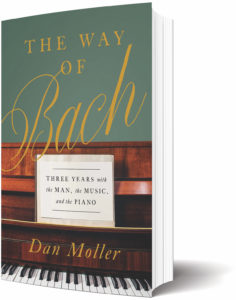The concept behind Dan Moller’s recently published The Way of Bach: Three Years With the Man, the Music, and the Piano, is a good one. It tells of the author’s journey to learn to play Bach on the piano as an adult — a classical music version of Zen and the Art of Archery.

Specifically, Moller yearns to learn the first Fugue in C minor from The Well-Tempered Clavier. It’s a piece he fell in love with against all odds — he grew up listening to heavy metal.
“Perhaps it was its very brusqueness that gripped me as a sullen teenager,” writes Moller. “I couldn’t relate to the gilded parlors of Venice and Vivaldi, or the music of Versailles — I was from the Boston suburbs; I wore flip-flops and T-shirts. But this music, written by an organist glowering in his stony aerie? Well, that made some sense to me. Salem wasn’t very far; we read peevish Puritans like Hawthorne in English class, and I sensed a connection.”
The book is well-written, if verbose at times. Moller is a philosophy professor at the University of Maryland. In his introduction, he admits that he is a total musical amateur and not a musicologist.
Yet he chooses to use many musical terms in the book that only serve to alienate the reader. (He does include a glossary, though the terms are not always well explained.) The book might have been improved if it used simpler English and took a more down-to-earth tone. And his historical commentary cries out for fact-checking.
Moller expresses a strong dislike for teachers. “The piano teacher’s goal is to make the student proficient at playing the piano, but I had no desire to be a good pianist,” Moller writes. “What I wanted was to play Bach. Only Bach. … I couldn’t bear to spend years trudging through workbooks of children’s songs and exercises, especially having reached my forties.”
This sort of attitude is understandable. But one reason why teachers are needed is to prevent injuries. Playing a musical instrument without the right technique is like attempting a backflip without any training. Sure enough, Moller has flare-ups from carpal tunnel syndrome throughout the book.

Moller’s strong opinions about classical music are often humorous. He bad-mouths the harpsichord in no fewer than 11 instances, comparing the sound to “the thin rattling of a child tinkling into a jar.” He also shares his dislike of Beethoven, Puccini, Chopin, Copland, and Mozart (though he eventually comes around to Mozart).
You don’t need to be an expert to have a valid opinion — and not all classical music has to be universally liked — but I worry that this book might discourage people from listening for themselves. Indeed, many people think they don’t like classical music because they’ve been told they shouldn’t. In that way, the book is somewhat self-defeating.
Nonetheless, there is some truly inspired writing at the end of The Way of Bach: “…we arrive at the final stretto, when the subject enters more and more insistently, overlapping with itself like waves crashing against the shore, and the pedal point sounds deep in the bass, a low, whooshing F, and the cadential harmony looms across the bars that race forward like the shoreline, and at last the final chord sounds, a colossal F major voiced clear across the keyboard, may it sustain forever in the divine fermata, world without end.”
I wish that Moller had applied the same care to the rest of the book. And maybe consulted a musicologist or two. He might learn that they’re not all so bad.
